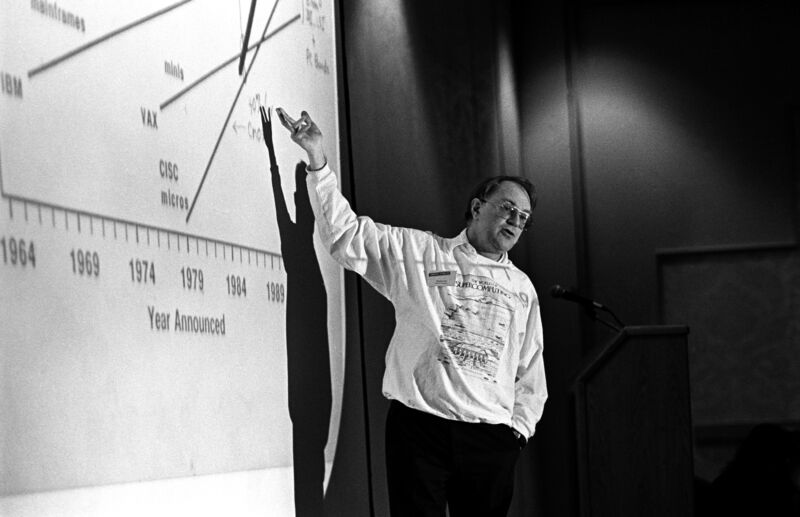
Computer pioneer Gordon Bell, who as an early employee of Digital Equipment Corporation (DEC) played a key role in the development of several influential minicomputer systems and also co-founded the first major computer museum, passed away on Friday, according to Bell Labs veteran John Mashey. Mashey announced Bell’s passing in a social media post on Tuesday morning.
“I am very sad to report [the] death May 17 at age 89 of Gordon Bell, famous computer pioneer, a founder of Computer Museum in Boston, and a force behind the @ComputerHistory here in Silicon Valley, and good friend since the 1980s,” wrote Mashey in his announcement. “He succumbed to aspiration pneumonia in Coronado, CA.”
Bell was a pivotal figure in the history of computing and a notable champion of tech history, having founded Boston’s Computer Museum in 1979, which later became the heart of the Computer History Museum in Mountain View, with his wife Gwen Bell. He was also the namesake of the ACM’s prestigious Gordon Bell Prize, created to spur innovations in parallel processing.
Born in 1934 in Kirksville, Missouri, Gordon Bell earned degrees in electrical engineering from MIT before being recruited in 1960 by DEC founders Ken Olsen and Harlan Anderson. As the second computer engineer hired at DEC, Bell worked on various components for the PDP-1 system, including floating-point subroutines, tape controllers, and a drum controller.
Bell also invented the first UART (Universal Asynchronous Receiver-Transmitter) for serial communication during his time at DEC. He went on to architect several influential DEC systems, including the PDP-4 and PDP-6. In the 1970s, he played a key role in overseeing the aforementioned VAX minicomputer line as the engineering manager, with Bill Strecker serving as the primary architect for the VAX architecture.
After retiring from DEC in 1983, Bell remained active as an entrepreneur, policy adviser, and researcher. He co-founded Encore Computer and helped establish the NSF’s Computing and Information Science and Engineering Directorate.
In 1995, Bell joined Microsoft Research where he studied telepresence technologies and served as the subject of the MyLifeBits life-logging project. The initiative aimed to realize Vannevar Bush’s vision of a system that could store all the documents, photos, and audio a person experienced in their lifetime.
Bell was elected to the National Academy of Engineering, National Academy of Sciences, and American Academy of Arts and Sciences. He received the National Medal of Technology from President George H.W. Bush in 1991 and the IEEE’s John von Neumann medal in 1992.
“He was immeasurably helpful”
As news of Bell’s passing spread on social media Tuesday, industry veterans began sharing their memories and condolences. Former Microsoft CTO Ray Ozzie wrote, “I can’t adequately describe how much I loved Gordon and respected what he did for the industry. As a kid I first ran into him at Digital (I was then at DG) when he and Dave were working on VAX. So brilliant, so calm, so very upbeat and optimistic about what the future might hold.”
Ozzie also recalled Bell’s role as a helpful mentor. “The number of times Gordon and I met while at Microsoft—acting as a sounding board, helping me through challenges I was facing—is uncountable,” he wrote.
Former Windows VP Steven Sinofsky also paid tribute to Bell on X, writing, “He was immeasurably helpful at Microsoft where he was a founding advisor and later full time leader in Microsoft Research. He advised and supported countless researchers, projects, and product teams. He was always supportive and insightful beyond words. He never hesitated to provide insights and a few sparks at so many of the offsites that were so important to the evolution of Microsoft.”
“His memory is a blessing to so many,” wrote Sinofsky in his tweet memorializing Bell. “His impact on all of us in technology will be felt for generations. May he rest in peace.”
